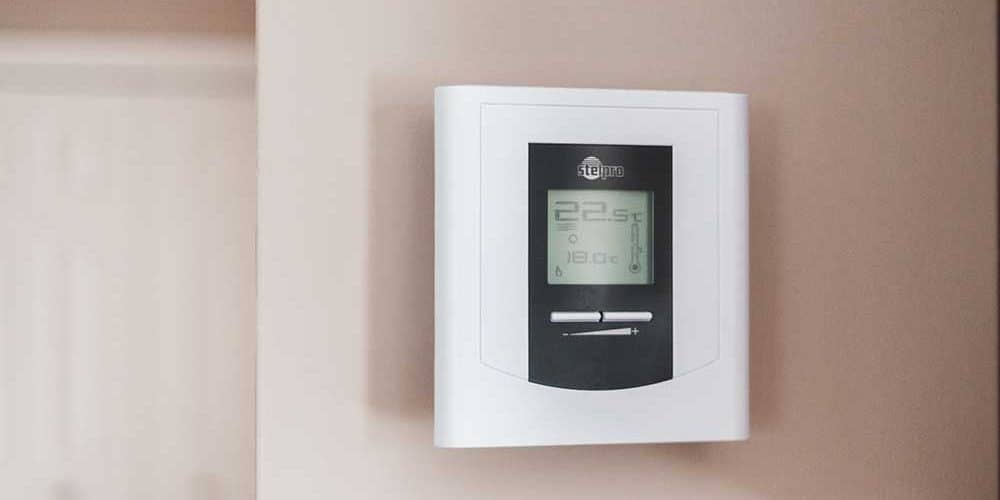Stay warm, save money, and reduce your impact on the environment with these three easy ways to use your heating system more efficiently…
Ensure your boiler is up to par
Having an efficient heating system operating on low carbon fuel is one of the most important steps you can take to reduce your fuel bills and your carbon dioxide emissions. The best place to start is with your boiler. According to the Energy Savings Trust, heating, and hot water accounts for over half of what you spend in a year on energy bills, so a boiler that is working efficiently will make all the difference.
When condensing boilers first came onto the market they were rated as A, B, or C (A being the most energy efficient), but nowadays, any boiler coming onto the market must be A rated energy efficient.
While regular servicing will increase your boiler’s longevity, there will come a point when you should consider changing your boiler, whether it be due to odd smells emitting from it, frequent breakdowns, higher (unexplained) bills, or your boiler flame is burning yellow instead of bright blue and cannot be remedied – a new boiler may be on the cards.
It is widely proven that a less efficient boiler will cost you more money to run. British Gas state that modern A-rated boilers operate at over 90% efficiency, whereas older G-rated boilers run at 70% or less therefore, replacing your old G-rated boiler with a new A-rated energy efficient boiler can save you up to £580 per year.
What makes modern boilers more efficient? The main reason is because modern boilers are ‘condensing.’ A condensing boiler recovers heat from the exhaust flue gas and uses it to heat the central heating water.
Use your heating controls effectively
Once you are happy that your boiler is working as efficiently as possible, you can ensure the rest of your heating system is up to scratch. Understanding and using your heating controls properly is a big part of this.
By heating controls, we mean things like timers, thermostats and plumbing and heating components, in short it is anything that helps you manage when the heating should be on and what the temperature should be. There are some high-tech heating controls on the market with many people able to operate their room thermostat from their phone. It’s possible to set the heating to come on when we want it to rather than at a set time every day and determine the temperature, we want it to come on at, as well as turn it up and down as needed. The problem is, some people don’t understand their controls and therefore, do not use them effectively.
At the very least your central heating system should include a programmer (to control time), at least one room thermostat and, if you have radiators, thermostatic radiator valves (TRVs). Systems with a hot water cylinder should also include a cylinder thermostat. Aside from these core elements, there are many additional control functions that can be included in a modern heating system to make it easier to operate it effectively and efficiently.
You can upgrade or install heating controls without replacing your boiler. Consider new heating controls if you don’t have a programmer, at least one room thermostat or TRVs on radiators. These will all make a significant difference to heating your home efficiently.
This video by the Energy Saving Trust on how to use your room and radiator thermostats efficiently:

Key tips for an efficient boiler heating system
- Programme your boiler to come on and off at the times that you need it. Don’t have it on 24/7.
- If your house isn’t getting warm quick enough, turn up your boiler thermostat.
- Set your room thermostat between 18 and 21 degrees.
- Set your individual radiator thermostats to the heat required in each room (for example, bedroom reads might be kept low in the day, but turn them up at night while you sleep. Likewise, the rad in a spare room can be turned off completely when not in use).
Top tip:
Your central heating system is only as efficient as your house, so if you have a got a window that has fallen out and you’re trying to heat the house, you won’t succeed, no matter how efficient your heating system is because the heat will be seeping straight out of the window. Good insulation and well insulated doors and windows all play a huge role in trapping heat in your house too.
Introduce water flow restrictors
We’ve spoken about heating energy efficiency, but hot water energy efficiency is important too. A fantastic way to reduce the amount of hot water you use is to fit water flow restrictor to the taps.
Within new build properties, all taps must be regulated to provide no more than a certain flow rate to comply with water bylaws. If your property does not already have water flow regulators on the taps, it is possible (and relatively easy) to fit them to regulate the amount of water that flows out. Next time you turn on the hot water tap to wash your hands, look carefully at the water flow…by how much can you turn the water down and still wash your hands sufficiently? Consider the difference in water used and how much you normally waste just by washing your hands.
It might seem like a minor change, but when you add this up over the course of a year, it will make a huge difference to your water usage and the amount of hot water that your system needs to heat up.

